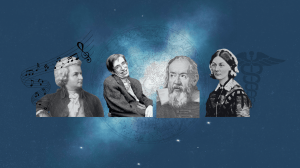Tag: Alvin Powell
-
Science & Tech
When the sky turned black
Director Ken Burns presented clips of his new documentary on the Dust Bowl at Harvard’s Boylston Hall, talking about the creative process that he uses in his films.
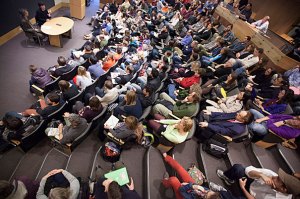
-
Health
An experiment gone horribly awry
Victims of U.S. syphilis experiments in Guatemala are still awaiting compensation that may or may not come, even as new laws passed in the wake of 9/11 make it harder, in some circumstances, to sue disease researchers for wrongdoing, panelists at Harvard Law School said.
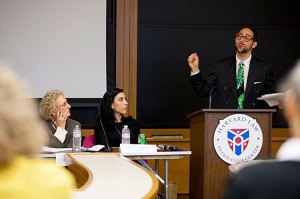
-
Health
Green light for Obamacare
Health care specialists discussed post-election Obamacare, including potential bumps in the road, in a panel talk at the Harvard School of Public Health.
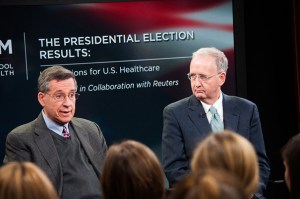
-
Health
Probing sleep’s drowsy mystery
Harvard researchers have worked for years to understand better the familiar mystery of sleep, highlighting not only what happens when we close our eyes, but also the effects on us when we don’t.
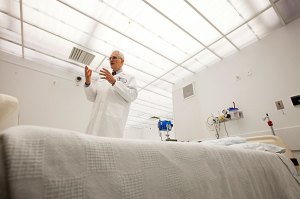
-
Health
So doggone complicated
Geneticist Elaine Ostrander runs a comparative-genomics lab that examines dog DNA to understand better the traits that might aid understanding of human diseases.
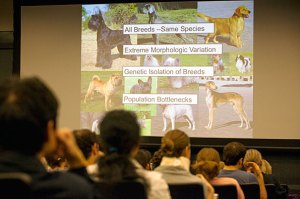
-
Nation & World
The psychology of poverty
A fellow in a new joint Harvard-MIT fellowship program in economics, history, and politics opens a lab in Kenya to illuminate the economic decision-making of those studied least by economists: the poor.
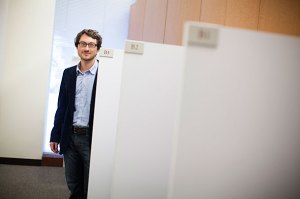
-
Health
A plan to stop cholera’s spread
HMS Professor John Mekalanos, an expert on cholera, suggested Oct. 22 that relief workers and peacekeepers from cholera-endemic countries be treated with antibiotics before serving in cholera-free countries, as a way to avoid a repeat of the post-earthquake cholera epidemic in Haiti, which has killed thousands.
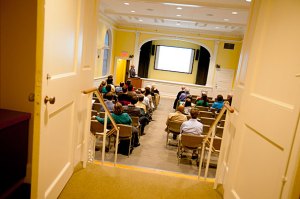
-
Science & Tech
Good day, moons
CfA fellow David Kipping is heading a hunt for astronomical bodies at the edge of our ability to detect them: moons circling planets in other solar systems.
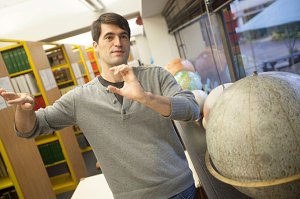
-
Science & Tech
Seeking to connect on water issues
The U.S. lacks a national water policy, resulting in pushing and pulling by a wide array of competing interests in managing the nation’s water supply, said experts at a Radcliffe symposium.
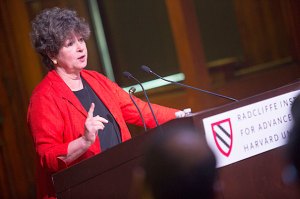
-
Health
Closing the care gap
Models of low-cost, high-quality health care are cause for hope that disparities in treatment between U.S. whites and minorities can be closed, said speakers at a University-wide symposium on Oct. 11.
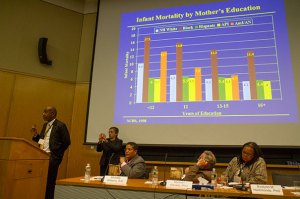
-
Arts & Culture
The epic of Hadzi
The stone sculpture “Gilgamesh” by the late Professor Dimitri Hadzi, who died in 2006, was donated to Harvard’s Mineralogical and Geological Museum by his wife, Cynthia.
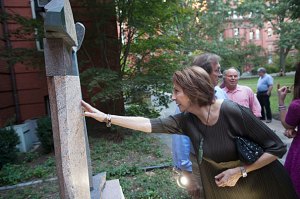
-
Science & Tech
A close eye on population growth
Joel Cohen, head of the Laboratory of Populations at Rockefeller and Columbia universities, looked at the latest projections for world population growth, and factors that could alter them, in a Harvard talk.
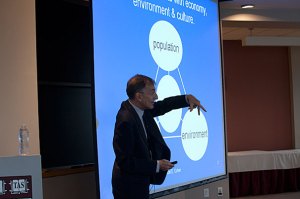
-
Health
Mothers in peril
Every 90 seconds, a mother dies in pregnancy or of childbirth complications — a tragic statistic, but one that may drive efforts to improve health care in developing countries, said public health specialists in a Harvard talk.

-
Science & Tech
‘Silent Spring,’ 50 years on
Environmentalists and faculty members gathered at Sanders Theatre to mark the 50th anniversary of the publication of Rachel Carson’s “Silent Spring,” which catalyzed the environmental movement in its impassioned presentation of the impact of chemicals on nature.
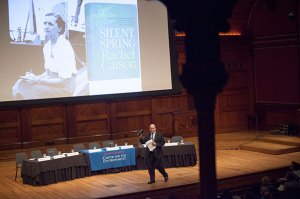
-
Arts & Culture
The book club goes online
Five of Harvard’s regional centers are teaming up on an outreach program to teachers that takes them on a literary world tour, through an online book club featuring readings that illuminate ordinary life in Libya, Morocco, the Dominican Republic, Russia, and Nigeria.
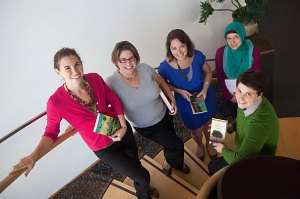
-
Nation & World
Hope for continental recovery, in 2013
A top European Union official says there are signs that reform measures taken in response to the economic crisis in Europe are working, and that a recovery could begin in 2013.
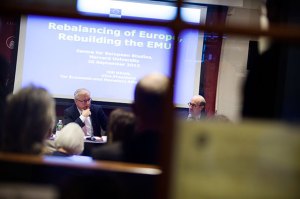
-
Health
Putting humanity in its place
Professor Charles Langmuir worked for 10 years on an update of “How to Build a Habitable Planet,” a textbook published in 1985 by famed geoscientist Wallace Broecker.
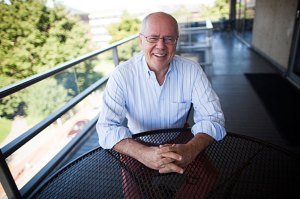
-
Campus & Community
Coming back, looking forward
Members of Harvard’s Corporation and Board of Overseers, past and present, gathered at Harvard Law School’s new Wasserstein Hall Sept. 22 for a reunion afternoon featuring a panel discussion on teaching innovation and a question-and-answer session with Harvard President Drew Faust.
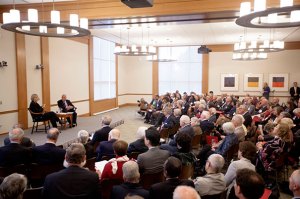
-
Science & Tech
An invasion of New England
While new species naturally expand to other places and sometimes disrupt the scene when they arrive, the pace of introduction of invasive species has picked up enormously over the past century and a half, stressing and transforming New England forests.

-
Science & Tech
Managing just fine
Measurements of stress hormones and self-reports of anxiety show that leaders in stable organizations experience less stress than their subordinates, likely because they have greater control over their office lives.
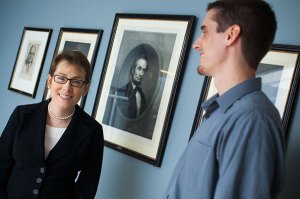
-
Nation & World
A firm voice on Europe
Jan Fischer, former PM and current presidential candidate in the Czech Republic, talked to a Harvard audience about the debt crisis and the possibility of a full European federation.

-
Health
For a health reform model, try Brazil
Scholars and public health experts gathered at the Harvard School of Public Health to examine Brazil’s progress toward meeting the United Nations’ Millennium Development goals, and to see if there are lessons that can be applied to other countries.

-
Science & Tech
Spoiled opportunity
Republican objections to a climate change “tax” have stained the cap-and-trade approach to tackling climate change, making it politically unpalatable, even though it proved effective at fighting acid rain over the past two decades.
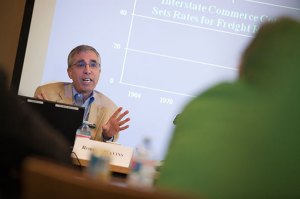
-
Science & Tech
Emergency planning
Six of Harvard’s deep thinkers on climate change and sustainability took the stage Sept. 18 in the second annual Harvard Thinks Green.
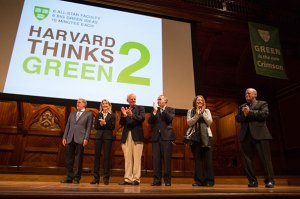
-
Nation & World
A warning from inside Tunisia
A Tunisian constitutional expert said Sept. 17 that recent violence, coupled with moves by the ruling Islamist Ennahda party to enshrine religion in the nation’s new constitution, are a bad sign for a pluralistic, democratic future.

-
Nation & World
After 9/11, health lessons ignored
The public health lessons of 9/11 and subsequent anthrax attacks haven’t been learned, said Pulitzer Prize-winning author Laurie Garrett during a talk at the Harvard School of Public Health.
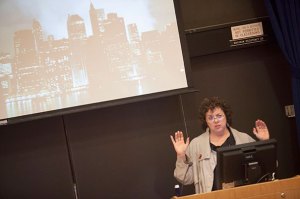
-
Science & Tech
Capturing the stars
Alex Parker, a postdoctoral fellow at the Harvard-Smithsonian Center for Astrophysics, sees astronomical data as art as well as science.

-
Health
Tapping the body to fight disease
Researcher Biju Parekkadan is developing devices that employ cell therapy to help people with organ failure.


